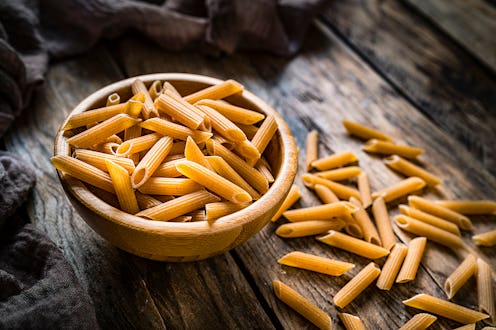Food
This Is How Long You Can Keep Dry Pasta At Home
“Your eyes are the best barometer to detect when dried pasta is no longer at its best.”

In my opinion, pasta is proof there is a god. If I could eat noodles for every meal, I absolutely would. Breakfast linguini anyone? However, the only pasta I have in my home is an elderly box of penne, begging the question, does pasta expire? There are so many different dishes you can make with pasta as the base ingredient — from spaghetti bolognese and mac and cheese to spinach tortellini — so you're going to want to make sure you're stocked up.
In the tree branch that describes the pasta world, it starts with fresh pasta vs. dried pasta. “Fresh pasta tends to be sheeted pasta made with the type of pasta machine that has rollers that press thick dough into a thin sheet. Dried pasta is typically extruded pasta, made with a machine that pushes dough out a small opening that mimics the shape of the final pasta form, says Linda Miller Nicholson, pasta extraordinaire and creator behind the popular colorful pasta Instagram account @saltyseattle. “They both have beautiful applications. Fresh pasta is typically useful for sauces that cook quickly and cling to the shape quickly, whereas dried pasta works best for sauces that take time to marry to the appropriate shape.” Nicholson explains to Bustle that in terms of cooking, the major difference is time. “Fresh pasta will typically finish cooking within a few minutes whereas dried pasta can take 10-15 minutes to cook to properly al dente,” she says.
Dried pasta is the kind you'll find in boxes at most grocery stores. It's more common than fresh pasta, especially for us on-the-go folks. Of course, fresh pasta is about one thousand times tastier than the boxed stuff, but who has time to hand-roll tagliatelle, pappardelle, fettuccine, or any of the other myriad sheeted shapes? “Fresh and dried pasta tends to have a significant textural difference, which is one of the first things we notice in how they taste. Dried pasta is more difficult to overcook, whereas fresh pasta needs to be eaten within a few minutes or else it will become soggy,” says Nicholson. And, fresh pasta sold at the grocery store often comes with a heftier price tag compared to its dried counterpart. So for those of us hoping to one day cook that questionable box of spaghetti lurking in the kitchen cabinet but don't know how to tell if dried pasta has gone bad, there are a few things you should know.
"Dried pasta can become inedible, but its shelf life is typically a few years as long as it’s stored properly," Alyssa Pike, RD, manager of nutrition communications at the International Food Information Council, tells Bustle. Nicholson agrees, saying that “dried pasta can be stored more or less indefinitely as long as it’s not exposed to sun or other heat compromising elements.” She also explains that “dried pasta is no longer excellent when it’s excessively cracked and brittle. Your eyes are the best barometer to detect when dried pasta is no longer at its best.”
Dried pasta is unlikely to grow harmful bacteria, but it does lose its flavor as it ages. "It’s helpful to know that date labels or 'expiration dates' (e.g. sell by, used by, best by) are based on quality, not safety — except for infant formula," Pike says. "So, yes, technically it is safe to eat dried pasta past its expiration date, although the quality of taste or texture may begin to change after its expiration date." The expiration date on a box of pasta is usually about one to two years.
"If your pasta is past its 'Best if Used By/Before' date, it’s a good idea to inspect it before you cook," Pike says. "Overt changes in texture or smell are indications that the pasta is no longer safe to eat. As the saying goes: ‘When in doubt, throw it out.’”
Fresh pasta, on the other hand, has a very short shelf life and should only sit in your fridge for about two days, according to the U.S. Department of Agriculture's FoodKeeper app. You can extend the shelf life of fresh pasta to up to two months by freezing it, but when you have fresh pasta in the house, how long can you really wait without devouring it? Meanwhile, cooked pasta can be kept for three to five days in your refrigerator, and for up to two months in the freezer.
When it comes down to it, you should always use your best judgment when evaluating old pasta. If the noodles are discolored or show visible signs of mold, it’s best to throw that old pasta away and start fresh.
Experts:
Alyssa Pike, RD, manager of nutrition communications, International Food Information Council
Additional reporting by Kathryn Kattalia
This article was originally published on